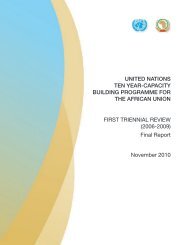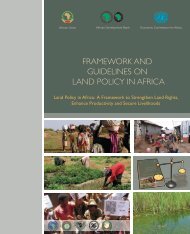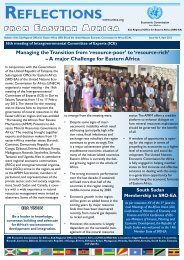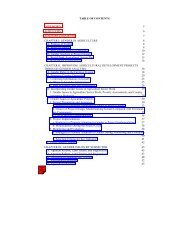A Decade of NEPAD - Economic Commission for Africa - uneca
A Decade of NEPAD - Economic Commission for Africa - uneca
A Decade of NEPAD - Economic Commission for Africa - uneca
You also want an ePaper? Increase the reach of your titles
YUMPU automatically turns print PDFs into web optimized ePapers that Google loves.
66 A <strong>Decade</strong> <strong>of</strong> <strong>NEPAD</strong>: Deepening <strong>Africa</strong>n Private Sector and Civil Society Ownership and Partnership<br />
by <strong>Africa</strong>n governments <strong>for</strong> CSO and other stakeholder<br />
contributions, and, un<strong>for</strong>tunately, this prerequisite varied<br />
considerably across the continent.<br />
In countries such as Benin, Botswana, Ghana, South <strong>Africa</strong>,<br />
Malawi, Tunisia, Senegal, and Niger, CSOs were found<br />
to have made meaningful contributions. In other states,<br />
such as Ethiopia and Egypt, governmental constraints<br />
and restrictions impacted active CSO participation in the<br />
country’s development processes.<br />
In reviewing the <strong>NEPAD</strong> process and the degree and types<br />
<strong>of</strong> engagement that have been experienced with the <strong>Africa</strong>n<br />
CSO community to date, feedback from OSSA and UNECA<br />
stakeholder <strong>for</strong>a and research reports have indicated that<br />
the depth and consistency with which the AU has pursued<br />
the establishment <strong>of</strong> CSO participation in its activities has<br />
yet to be replicated within the <strong>NEPAD</strong> process.<br />
And the findings <strong>of</strong> AGR II illustrate that in most likelihood<br />
significant domestic and international donor support<br />
and continued capacity building ef<strong>for</strong>ts will be required to<br />
facilitate enhanced and effective engagement between the<br />
<strong>Africa</strong> civil society community and <strong>NEPAD</strong>. Yet, AGR II<br />
also shows that properly resourced and engaged, the <strong>Africa</strong>n<br />
civil society can play a critically important role in taking<br />
<strong>NEPAD</strong>’s messages to the citizens <strong>of</strong> the continent and in<br />
supporting the implementation <strong>of</strong> the <strong>NEPAD</strong> programme.<br />
The AGR II findings in respect to the capacity needs <strong>of</strong><br />
<strong>Africa</strong>’s CSO community have not gone unnoticed by international<br />
donor institutions and multilateral organizations<br />
committed to <strong>Africa</strong>’s development. Thus, it is also <strong>of</strong> note<br />
that since the beginning <strong>of</strong> the 21 st century there has been<br />
a much more concerted ef<strong>for</strong>t to strengthen the capacity<br />
<strong>of</strong> <strong>Africa</strong>n CSOs and to establish wider continental, pan-<br />
<strong>Africa</strong>n, and international CSO networks. Key resource<br />
institutions and catalysts in this regard have included the<br />
UN Office <strong>of</strong> the Special Advisor on <strong>Africa</strong>, the European<br />
<strong>Commission</strong> (particularly through the PROINVEST programme),<br />
the Zimbabwe based <strong>Africa</strong> Capacity Development<br />
Foundation, and multilateral initiatives such as the<br />
Tanzania based Investment Climate Facility.<br />
An analysis <strong>of</strong> the relationship between <strong>NEPAD</strong> and the<br />
<strong>Africa</strong>n CSO community today reveals that there is indeed<br />
work toward improvement in progress. Although the level<br />
<strong>of</strong> engagement is yet not where either side would like <strong>for</strong> it<br />
to be, both sides would largely agree that the relationship<br />
has positively progressed from where it was at the inception<br />
<strong>of</strong> the <strong>NEPAD</strong> initiative.<br />
Furthermore, from a policy standpoint, it is clear to <strong>Africa</strong>n<br />
CSOs that the principles <strong>of</strong> participatory development have<br />
been captured in the <strong>NEPAD</strong> framework in the focus on<br />
Democracy and Political and <strong>Economic</strong> Governance and<br />
in the APRM programme.<br />
<strong>Africa</strong>n leaders also acknowledged in <strong>NEPAD</strong>’s framework<br />
that “the New Partnership <strong>for</strong> <strong>Africa</strong>’s Development will<br />
be successful only if it is owned by the <strong>Africa</strong>n peoples –<br />
united in their diversity”. In the Framework they have also<br />
called on all <strong>Africa</strong>n’s to mobilise in support <strong>of</strong> <strong>NEPAD</strong>:<br />
“We are there<strong>for</strong>e, asking the <strong>Africa</strong>n peoples to take up<br />
the challenge <strong>of</strong> mobilising in support <strong>of</strong> the implementation<br />
<strong>of</strong> this initiative by setting up, at all levels structures<br />
<strong>for</strong> organisation, mobilisation and action 83 .”<br />
To date, however, despite the l<strong>of</strong>ty aims espoused in the<br />
<strong>NEPAD</strong> framework, the precedent that exists <strong>for</strong> participatory<br />
development on the continent, and the recent ef<strong>for</strong>ts<br />
to develop a people centred <strong>Africa</strong>n Union, <strong>NEPAD</strong>’s<br />
leadership has been criticized over much <strong>of</strong> the past ten<br />
years <strong>for</strong> not adequately engaging with the <strong>Africa</strong>n CSO<br />
community and giving it much <strong>of</strong> a voice in the implementation<br />
<strong>of</strong> <strong>NEPAD</strong>.<br />
In fact at the inception <strong>of</strong> <strong>NEPAD</strong>, because <strong>of</strong> these feelings<br />
and perceptions <strong>of</strong> exclusion, many within the civil<br />
society were very sceptical <strong>of</strong> the initiative, if not openly<br />
antagonistic toward the programme. They asserted that<br />
the initiative lacked legitimacy as it was developed in a<br />
top down manner, and without significant CSO input.<br />
In addition to lamenting the lack <strong>of</strong> consultation and<br />
opportunity to contribute to the development <strong>of</strong> the NE-<br />
PAD framework, others within the CSO community felt<br />
strongly that the initiative’s ideological leanings were too<br />
pro-business, anti-poor and western in orientation.<br />
In the years subsequent to the launch <strong>of</strong> <strong>NEPAD</strong>, a number<br />
<strong>of</strong> different focus groups met to assess how best to bridge<br />
the initial chasm that existed between <strong>NEPAD</strong> and the<br />
CSO community.<br />
83 The <strong>Africa</strong>n Union’s New Partnership <strong>for</strong> <strong>Africa</strong>’s Development,<br />
<strong>Africa</strong>n Union and United Nations, <strong>Africa</strong> Section, Department <strong>of</strong><br />
Public In<strong>for</strong>mation, 2007, p. 11







